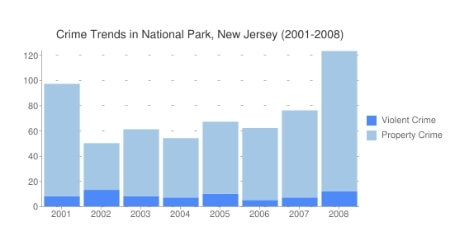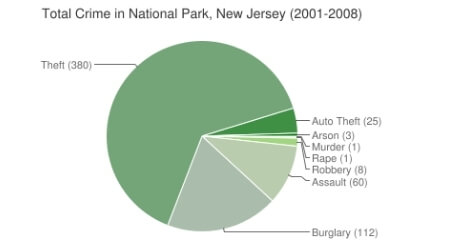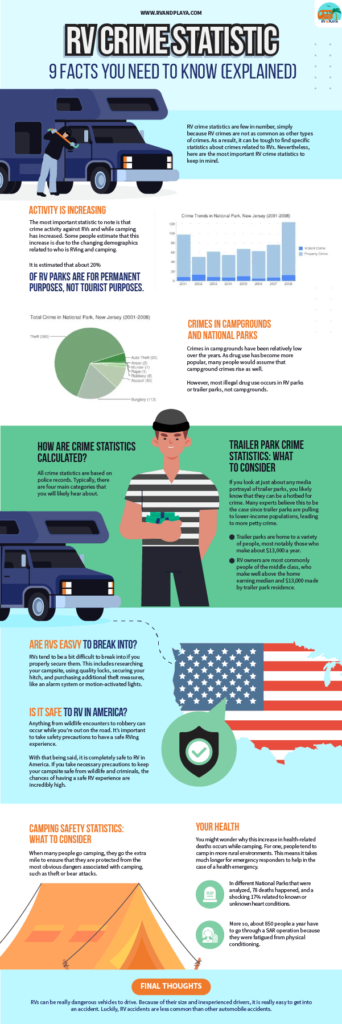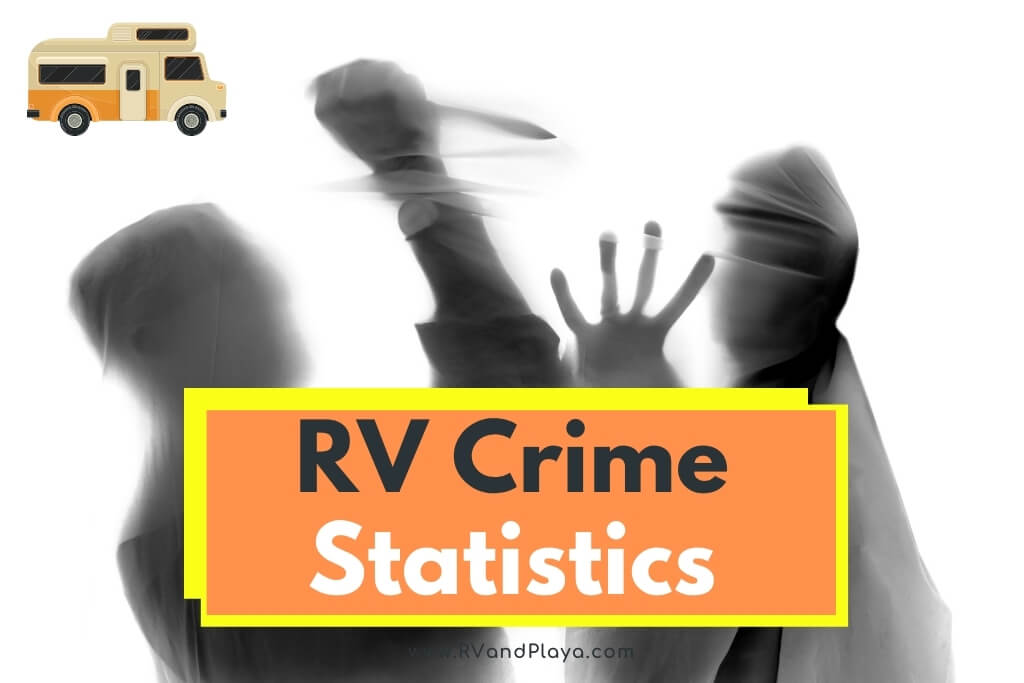Are you looking for RV crime statistics?
RVs are a fun and exciting way to see the world, but they come with specific crime risks. Although campsites and RV parks are not necessarily the hotbed for crime, knowing common RV statistics can help you stay protected on the road.
For example, knowing where RV crimes take place and the likelihood of being a victim can help you determine risks, camping locations, and more. Unfortunately, finding RV statistics can be challenging due to the rarity of RV crimes in general.
In this article, we are going to look at key RV crime statistics and facts you should know. This includes the most common RV crime stats, how crime statistics are calculated, and more. Let’s jump right into RV crime statistics to help you be more educated and safe on the road.
Table of Contents
Key RV Crime Statistics to Know
RV crime statistics are few in number, simply because RV crimes are not as common as other types of crimes. As a result, it can be tough to find specific statistics about crimes related to RVs. Nevertheless, here are the most important RV crime statistics to keep in mind.

Activity Is Increasing
The most important statistic to note is that crime activity against RVs and while camping has increased. Some people estimate that this increase is due to the changing demographics related to who is RVing and camping.

Before, RVing was something people did for vacation and to see the world. Today, there are much more full-time RVers who make very little money and take up permanent addresses at these RVing destinations. Many RVers don’t even go to sites associated with tourism.
👉 It is estimated that about 20% of RV parks are for permanent purposes, not tourist purposes.
As more people are attracted to RVing, crime will naturally go up. This is especially true if lower-income demographics are attracted to the locations, which is true in the case of RV parks.
Crimes in Campgrounds and National Parks
Crimes in campgrounds have been relatively low over the years. As drug use has become more popular, many people would assume that campground crimes rise as well.
However, most illegal drug use occurs in RV parks or trailer parks, not campgrounds.
👉 Despite this fact, National Park officers are 12 times more likely to be hurt on the job than FBI agents.
This is because National Parks and forests attract more dangerous crime, such as methamphetamine labs, for the offered seclusion.

Most crime statistics related to campgrounds and RVing are studied at National Parks specifically. Although National Park crime is not specific to RVs, many RVers spend a lot of time in National Parks.
Learning crime rates for National Parks can allow you to estimate the most likely RVing crimes you may fall victim to.
Below is a list of the most frequent crimes in national parks:
| Crime Type | Percentage (%) |
|---|---|
| Crimes against persons | 57% |
| Property crimes | 9% |
| Crimes against society | 10% |
| Natural resource crimes | 6% |
| Drug crimes | 3% |
| Cultural resources crimes | 3% |
| Other | 2% |
Boondocking Crimes
For more serious RVers, boondocking may seem more fun than hitching up at a campsite. Boondocking is when you hitch your campsite in a remote location. Many people fear that this is more dangerous because of the seclusion. However, the opposite is true.
Criminals look for locations with high profit and low risk. Secluded locations tend to be low risk but low profits, meaning that they are less of a target than campgrounds and big cities.
That does not guarantee you won’t be a victim of crime, but it simply tells you that the chances of being a victim of a crime while boondocking are incredibly low. It is so low, in fact, that there are no statistics about it.
What These Stats Tell Us
These stats may be a bit confusing, but they tell us that RV crime is something you should become more aware of.
👉 Given that 20% of RVers live in their RVs permanently, you need to be aware of which locations are safe and which ones are not. Typically, the more tourist or recreational destinations will be much safer.
👉 At the same time, only about 9% of National Park crimes relate to property. Given that your RV is considered property, this tells us that RV crime should not be your number one concern when camping at an RV park. Instead, crimes against persons are much more likely.
Even with that scary thought in mind, crimes in campgrounds are still really low.
👉 You only have a one in 25,000 chance of being a victim of some sort of major crime in an RV campground. To put that in perspective, that is only a .004% chance.
👉 When it comes to robbery elsewhere, there is a 1.2% chance of being robbed. In both categories, the chances of being a victim of a major crime such as robbery are incredibly low.
Still, the chances of being a victim of a major crime in an RV campground is shockingly lower than it is elsewhere.
“…feel free to use our infographics. Just remember to give us credit.“

How Are Crime Statistics Calculated?
All crime statistics are based on police records. Typically, there are four main categories that you will likely hear about.
👉 The arrest rate tells you how many arrests are made per a 100,000 population or 100,000 people who are at risk for being arrested.
At-risk population is another type of crime statistic, though it is less relevant to RV crime statistics in this article.
The clearance rate tells you what percentage of crimes have been cleared. This number is calculated by dividing the cleared crimes by the total number of crimes reported. As a result, this statistic will almost always be reported in terms of a percentage.
👉 The most pertinent statistic related to RV crime is the crime rate. The crime rate of an area is found by dividing the number of crimes by 100,000.
This tells the crime rate as a whole, not the crime rate related to RVs. When it comes to RVs, you can look at crime rate hotbeds, arrest rate associated with RV crimes, and the clearance rate for more information.
Trailer Park Crime Statistics: What To Consider
If you look at just about any media portrayal of trailer parks, you likely know that they can be a hotbed for crime.
Many experts believe this to be the case since trailer parks are pulling to lower-income populations, leading to more petty crime.
If you are RVing, it is generally discouraged from parking your RV in a trailer park. Not only will this help prevent crime, but it is also smart since trailer parks are not specifically designed for transient trailers.
Instead, you should opt for an RV park or campground, which actually has very low crime rates.
Even though trailer parks and RV parks may look the same on the outside, their crime rates differ because of the demographic that is attracted to these locations.
👉 Trailer parks are home to a variety of people, most notably those who make about $13,000 a year.
RV parks, on the other hand, are often travel destinations for RV owners.
👉 RV owners are most commonly people of the middle class, who make well above the home earning median and $13,000 made by trailer park residence.
Due to this difference in demographics, RV parks tend to be much safer than trailer parks.
Is RV Camping Dangerous?
Because our RVs are such an expensive investment, many people assume that camping in an RV can be dangerous. Although there are certain risks associated with RV camping, RV camping is actually a pretty safe experience.
Campgrounds, RV campgrounds, and RVs, in general, tend to experience very low crime rates.
With that being said, there are certain risks to be aware of. For example, robberies or break-ins can occur, though they don’t occur often.
To help combat RV crime, you can go the extra mile to protect your RV. This includes using good locks, securing your hitch, and picking campsites wisely.
Additionally, you need to make sure to drive your RV safely. Although this is not associated with crime, RV accidents are much more common than RV crime, making it imperative to know how to drive and use tools related to your RV.
Are RVs Easy To Break Into?
RVs tend to be a bit difficult to break into if you properly secure them. This includes researching your campsite, using quality locks, securing your hitch, and purchasing additional theft measures, like an alarm system or motion-activated lights.
Although RVs may appear easy to break into, RV break-ins are actually really scarce. In comparison to car and house break-ins, there are way fewer RV break-ins because they are in more rural environments and tend to house less pricey items, like computers or TVs.
Is It Safe To RV in America?
RVing is a popular pastime in America. Even though many people RV for vacation, it comes with notable risks.
Anything from wildlife encounters to robbery can occur while you’re out on the road. It’s important to take safety precautions to have a safe RVing experience.
With that being said, it is completely safe to RV in America. If you take necessary precautions to keep your campsite safe from wildlife and criminals, the chances of having a safe RV experience are incredibly high.
Though taking extra precautions does not guarantee safety, it increases the chances considerably.
Additionally, one of the most important things you can do to ensure a safe RVing experience is to read reviews about your selected location and thoroughly check the site out before deciding to unhitch.
If you read reviews about active wildlife or dangerous people, select a different hitching location instead.
More so, make sure to scope the place out when you get there. Pay attention to the locals and the flow of traffic.
Simply being aware of your surroundings beforehand can make a huge difference between a safe and unsafe RVing experience. If you go these extra miles, you will find RVing in America to be a pretty safe and fun pastime.
Camping Safety Statistics: What To Consider
When many people go camping, they go the extra mile to ensure that they are protected from the most obvious dangers associated with camping, such as theft or bear attacks.
Although it’s important to protect against situations such as these, it’s more common to find yourself in an unsafe situation for other reasons.
Read also: How to Prevent Travel Trailer Theft – 13 Steps that Work
Your Health
Shockingly enough, prior health conditions play a big part in camping safety.
👉 In different National Parks that were analyzed, 78 deaths happened, and a shocking 17% related to known or unknown heart conditions.
👉 More so, about 850 people a year have to go through a SAR operation because they were fatigued from physical conditioning.
You might wonder why this increase in health-related deaths occurs while camping. For one, people tend to camp in more rural environments. This means it takes much longer for emergency responders to help in the case of a health emergency.
Additionally, camping requires a lot of physical dexterity and health. If you’re not physically capable, you can easily overwork yourself.
This is especially true given that we did not even talk about the statistics related to exhaustion, dehydration, heat strokes, broken bones, etc.
In addition to your health, you also need to pay attention to roads, tools, wild animals, and your housing environment.
Final Thoughts
As crime in RV parks and campgrounds are increasing, you need to be more aware of crime trends and safety measures.
By knowing these trends, you can better protect yourself, your loved ones, and your property. Taking the time to invest in good locks and additional anti-theft measures can go a long way.
At the same time, RVing is much safer than many other forms of recreation. As we learned, you have a much lower chance of being a victim of a crime while camping than you are simply living your life at home.
Although this does not give you an excuse to be lax in terms of your safety preparation, it may give you peace of mind.
References
RV Service Directory
Recent Posts
Is Toyota Remote Connect Free? (Subscription, Services Plans)
Does Toyota Remote Connect have an included trial? It used to be the case that, when you bought a new car, you made one straightforward payment and that was it. Now, it feels like there are...
Toyota Safety Connect: What It Is And Why You Need It? Whether you’re buying a new Toyota or you’ve had one for a while you will have been given the hard sell on their Connected Services but do...

